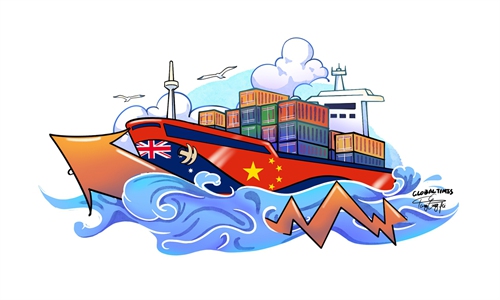
Germany's new foreign minister and co-leader of the Green Party Annalena Baerbock. Photo: AFP
As China-Australia relations are witnessing a thaw, Germany's Foreign Minister Annalena Baerbock has once again hyped up the cliché of "China threat" in a virtual address to an Australian think tank. What is her intention? Baerbock told the Lowy Institute on Tuesday that China was challenging the "very fundamentals of how we live together in this world," and she praised Australia for serving as a "role model" for resisting Chinese "economic coercion."In addition to being a representative figure of the German Greens, Baerbock is also a pro-American politician who holds hostile views on China. Baerbock's remarks in Australia actually expressed both her personal opinion and the US' attitude. However, this time, Baerbock went beyond the relationship between China and Germany, but put the Australian issue in the context of the ideological confrontation between the West and China.
It is not surprising that Baerbock has proposed a tough stance on China, which aligns with her consistent position of viewing China as a threat and emphasizing the differences in ideology and social systems between China and Western countries. At the same time, the German foreign minister seemingly tries to speak boldly in defending Australia by discrediting China, using the so-called "economic coercion" narrative, which was originally a rhetorical trap hyped by the US.
Baerbock's remarks clearly exposed her deep-rooted prejudice against China, and also laid bare her pro-US stance. Not wanting to rely on China while unwilling to decouple from China, this is a typical US-style thinking. Politicians like Baerbock want to benefit from China's economic take-off, yet they're afraid that China will pose a threat with its rising power. So they are calling for "de-risking, " which is essentially politicizing and ideologizing economic and trade issues.
Sun Keqin, a research fellow at the China Institutes of Contemporary International Relations, believes that the German foreign minister's remarks in Australia also reflect her personal contradiction. Although she is critical of China and often makes offensive remarks, she also understands the importance of Germany-China relations.
"She regards China as a rival, but China itself has never harmed the interests of Germany, that's why many entrepreneurs and some politicians in Germany are very dissatisfied with Baerbock. If she can have a long-term and clear understanding of Germany's China policy, she will not be caught in the embarrassing situation of self-contradiction," Sun added.
Apart from smearing China, Baerbock also claimed that "numerous countries were pivoting to China because they lacked alternatives," and added that Germany wanted to "change this." "This is nonsense. The choices of these countries are actually based on their own economic interests. No matter in terms of cost and benefit, China is obviously the first choice," Cui Hongjian, director of the Department of European Studies at the China Institute of International Studies, told the Global Times.
Germany is a major trading country and has huge economic interests in the Asia-Pacific region. Theoretically, it should pay more attention to cooperation, reciprocity, and peaceful development. However, some pro-American politicians seem to have deviated from this path, regarding China as a rival of systemic challenges and blindly following the US strategy. This not only reflects Baerbock's personal views, but more dangerously, it could also drag Germany into a dangerous vortex in the Indo-Pacific region. These moves may jeopardize China-Germany relations, worsen the security situation in the Asia-Pacific region, and ultimately damage world peace.

